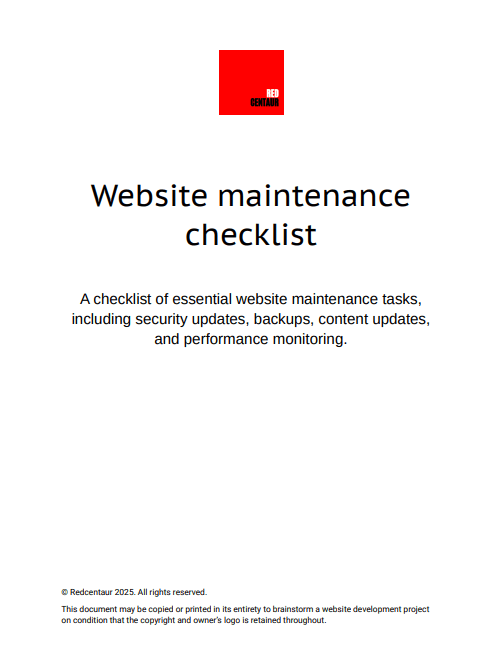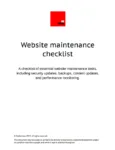- 1. Why is website maintenance important?
- 2. Essential website maintenance tasks
- 3. Website security updates
- 4. Content updates and SEO
- 5. Website backups and recovery
- 6. The benefits of professional website maintenance
- 7. Keep your UK business website fighting fit with our essential checklist
- 8. Website maintenance: a summary
Is your website a silent workhorse or a ticking time bomb? For many UK businesses, a website is their digital store-front, a crucial tool for attracting customers and driving sales. However, like any valuable asset, it needs regular care. Neglecting your website can lead to a host of problems, from slow loading times to security vulnerabilities. This article will explain why website maintenance is not just a good idea, but an essential investment for your business.
Why is website maintenance important?
Think of your website as a car. You wouldn’t drive it for years without an oil change or a service, would you? Similarly, your website requires ongoing attention to perform at its best. Regular website maintenance ensures your site remains secure, fast, and functional. It directly impacts user experience, search engine rankings, and ultimately, your bottom line.
Furthermore, a well-maintained website projects a professional image. It tells your customers that you care about their online experience and that you are a reliable business. Conversely, a broken or outdated website can quickly deter potential clients, sending them straight to your competitors. In today’s competitive digital landscape, you simply can’t afford to let your website fall by the wayside. Website maintenance is vital for continued success.
Essential website maintenance tasks
So, what exactly does website maintenance involve? It’s more than just a quick glance now and then. A comprehensive website maintenance plan includes a variety of tasks designed to keep your site in top condition.
First, you need to regularly check for broken links. These dead ends frustrate users and can harm your search engine optimisation (SEO). Also, make sure all forms are working correctly. A broken contact form means lost leads, which no business wants.
Next, you should always update your content management system (CMS), themes, and plug-ins. Outdated software is a major security risk. These updates often include important bug fixes and performance improvements. Therefore, installing them promptly is crucial.
Finally, review your website’s performance. Tools like Google Analytics can help you identify slow-loading pages or areas where users are dropping off. Addressing these issues can significantly improve user experience and engagement. All these elements contribute to effective website maintenance.
Website security updates
In an age of increasing cyber threats, website security updates are essential. Cyberattacks are becoming more sophisticated, and businesses of all sizes are targets. Neglecting security updates leaves your website vulnerable to malware, hacking attempts, and data breaches. This can lead to significant financial losses and severe damage to your reputation.
Many content management systems, such as WordPress, regularly release security patches. Applying these patches promptly closes known vulnerabilities, making it much harder for malicious actors to gain access to your site. Regularly scanning your website for malware and suspicious activity is also essential. Early detection can prevent a minor issue from becoming a major crisis. Staying on top of website updates is paramount.
Consider implementing a robust firewall and secure socket layer (SSL) certificate. An SSL certificate encrypts data transmitted between your website and its users, providing a secure connection. This is particularly important for e-commerce sites handling sensitive customer information. Strong website security builds trust with your audience.
Content updates and SEO
Your website isn’t a static brochure; it’s a dynamic marketing tool. Regular content updates are key to keeping your audience engaged and improving your search engine rankings. Search engines favour websites that are regularly updated with fresh, relevant content. This signals that your site is active and provides value to its visitors. This is a critical aspect of website maintenance.
Consider adding new blog posts, updating product descriptions, or refreshing existing pages with new information. This not only helps with SEO but also gives your visitors a reason to keep coming back. Furthermore, ensure your website is optimised for relevant keywords. This helps search engines understand what your site is about and display it to the right audience.
Keeping your website content fresh also involves checking for accuracy. Outdated information can mislead customers and harm your credibility. Regular audits of your content ensure everything is current and correct. This ongoing effort plays a big part in successful website maintenance.
Website backups and recovery
Imagine waking up one day to find your website completely gone. It’s a nightmare scenario, but one that can become a reality if you don’t have a solid backup and recovery plan. Don’t fall into the trap of thinking, “It’ll never happen to me.” Regular website backups are your safety net. They ensure that if anything goes wrong—whether it’s a server crash, a hacking attempt, or a human error—you can restore your website to a previous working state.
It is wise to implement automated daily or weekly backups. Store these backups in multiple, secure locations, ideally off-site. This protects your data even if your primary server experiences an issue. Furthermore, regularly test your backup recovery process. There is no point having backups if you don’t know how to restore them. This proactive approach to website maintenance can save you a lot of stress and money.
A good backup strategy is a crucial part of any website maintenance plan. It provides peace of mind, knowing that your valuable online presence is protected against unforeseen events. Don’t wait until disaster strikes to think about backups.
The benefits of professional website maintenance
While some basic website maintenance tasks can be handled in-house, many UK businesses find significant advantages in opting for professional website maintenance services. Experts can ensure all tasks are performed meticulously and proactively. This frees up your valuable time, allowing you to focus on running your core business operations.
Professional website maintenance providers offer a comprehensive range of services, including regular security monitoring, performance optimisation, and prompt technical support. They stay up-to-date with the latest web technologies and security threats, ensuring your website remains robust and secure. Furthermore, they can often identify and resolve potential issues before they escalate, preventing costly downtime.
Choosing a professional service also provides access to expert advice and support. If you encounter a complex technical problem or need assistance with a website update, their knowledge can be invaluable. Ultimately, investing in professional website maintenance is an investment in the longevity and success of your online presence. Keep your website running smoothly. Enquire about Redcentaur’s website maintenance packages.
Check out our website maintenance service.
Download our website maintenance checklist.

Keep your UK business website fighting fit with our essential checklist
Is your website a powerhouse or a potential problem? For UK businesses, a well-maintained website is about robust security, peak performance, and staying connected with your audience. Our Website maintenance checklist is your practical guide to keeping your online presence thriving.
This isn’t just another generic list. It’s packed with insights on:
- • establishing a maintenance schedule;
- • crucial security checks and updates to ward off threats;
- • bulletproof backup procedures to protect your data;
- • smart content update schedules to keep visitors engaged;
- • key performance monitoring metrics for a lightning-fast site;
- • essential SEO maintenance tasks to boost your visibility;
- • the often-overlooked importance of hardware maintenance; and,
- • vital email maintenance to keep your communications secure.
Don’t let your website become a forgotten corner of the internet. Download our free Website maintenance checklist today and ensure your online asset is always working hard for your business.
Enter your email below to receive your link to the downloadable checklist.
Send download link to:
Website maintenance: a summary
In conclusion, website maintenance is not an “optional extra;” it is a fundamental requirement for any UK business with an online presence. From ensuring robust security and optimal performance to keeping your content fresh and engaging, regular maintenance is key to attracting and retaining customers. Whether you manage it yourself or enlist professional help, prioritising website maintenance will protect your investment and contribute significantly to your business’s success in the digital world. For more insights, you can explore our article on Website development UK: A complete guide for businesses. You might also find our guide to Website hosting UK: What you need to know helpful.





